Central America
Panama government and protesters strike deals to clear key highway
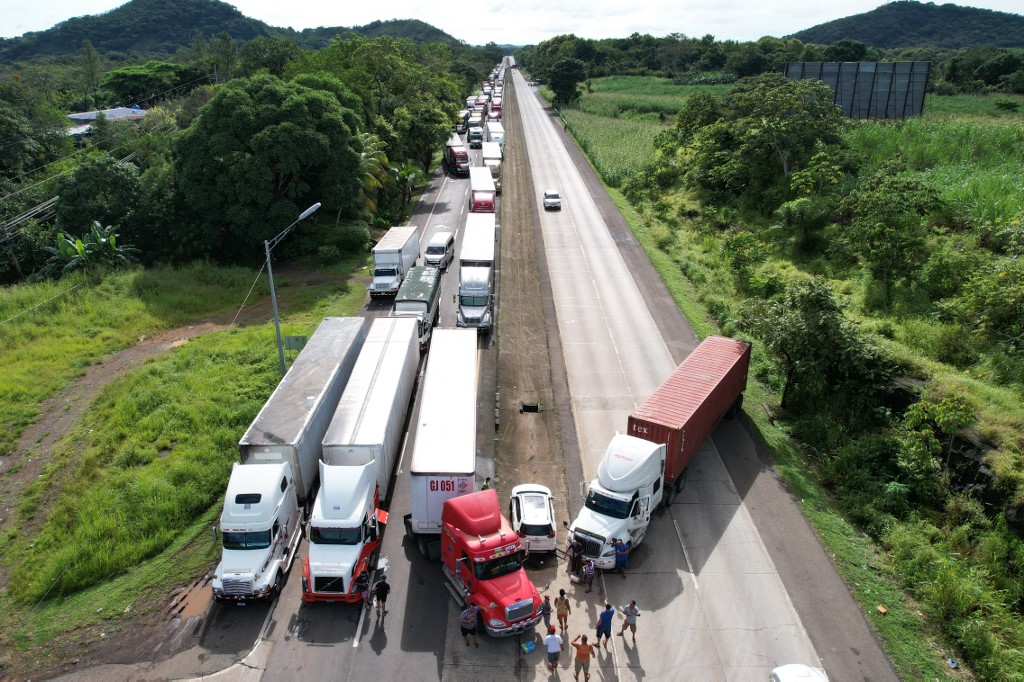
AFP
Panama’s government and indigenous leaders reached a second deal Sunday to clear all remaining demonstrators from the Panamerican Highway in exchange for lower fuel prices, ending a two-week blockade that had stymied food deliveries.
The government released footage from the signing of an initial agreement in far-west Chiriqui province, where most of the Central American country’s food is produced, and of a blocked section of the highway being cleared.
Angered by high prices and corruption, protesters had clogged the highway linking Panama to the rest of Central America over the past two weeks. Large trucks and banner-waving demonstrators paralyzed the strategic route, making it hard for the country of 4.4 million to feed itself.
To avert the crisis, a second deal was signed later Sunday in Santiago de Veragua, a city 250 kilometers (155 miles) northwest of Panama City, the epicenter of the negotiations and a protester stronghold.
“Many Panamanians have suffered from these stoppages,” said Vice-President Jose Gabriel Carrizo after signing the agreement. “This is a huge government effort.”
The deal establishes the fixed price of fuel for 91 and 95 octane gasoline and diesel, and is effective from July 18.
“The traffic of cars and heavy equipment in Veraguas is free,” Eduardo Cortés, who participated in the demonstrations on the highway, told AFP by phone.
The proposal of 3.25 dollars per gallon (3.78 liters), was better than the 3.30 offered in the deal made earlier in the day with the indigenous community of the Ngabe-Bugle Comarca in Chiriqui.
“This has not been easy, we have made progress with (reducing the cost of) the basic food basket,” said Luis Sanchez, a spokesman for the organizations promoting the protests.
In Panama City, a hundred people gathered on the waterfront to demonstrate. They all wore black, in contrast with the white suits worn by lawmakers during official ceremonies.
Food costs are “higher than what is earned. We have a big social problem,” lawyer Jaqueline Hurtado told AFP. “People are fed up and have taken to the streets to demonstrate for things to change.”
Retiree Iliana Arango said: “In my 68 years of life, I am tired of seeing governments that promise, go up, steal, go down, the next one follows and here we are lacking everything, medicine, education, food.”
Year-on-year inflation in Panama of 4.2 percent was recorded in May, along with an unemployment rate of about 10 percent and fuel price hikes of nearly 50 percent since January.
Despite its dollarized economy and high growth figures, the country has a high rate of social inequality.
Economic woes have led to a shortage of fuel in some parts of the country, and stalls at food markets in the capital have run out of products to sell.
Central America
Washington Imposes Visa Ban on La Modelo Director Amid Crackdown in Nicaragua

The United States government announced Wednesday that it has imposed visa restrictions on Roberto Clemente Guevara Gómez, director of Nicaragua’s largest prison, La Modelo, for his involvement in actions that violate human rights.
In a statement, U.S. Secretary of State Marco Rubio said the measure is intended to promote accountability for abuses committed under what he described as the “Murillo-Ortega dictatorship” against political prisoners.
Rubio specified that Guevara Gómez was designated for participating in “a gross violation of the human rights of a political prisoner.” The sanction was issued under the 2024 Department of State, Foreign Operations, and Related Programs Appropriations Act, which bars the sanctioned individual — and potentially immediate family members — from entering the United States.
“United States demands the immediate and unconditional release of all political prisoners unjustly detained in Nicaragua,” the statement added.
Ongoing tensions between Washington and Managua
Washington rejected Nicaragua’s November 2021 elections, in which President Daniel Ortega and his wife, now co-president Rosario Murillo, were reelected while seven potential challengers were in prison.
Relations between the two countries remain tense amid expanding U.S. sanctions and increasing diplomatic pressure on the Nicaraguan government.
On January 10, marking Ortega’s 19 years in power, Nicaragua released “dozens of detainees,” including political prisoners. The move came one day after the U.S. Embassy in Managua stated that “more than 60 people” remain “unjustly detained or disappeared” in the Central American nation.
U.S. officials have continued to push for the “unconditional release” of political prisoners rather than selective or temporary releases.
Ortega, 80, governs alongside Murillo with consolidated authority, having strengthened executive power through constitutional reforms and security measures, while the opposition has been weakened by imprisonment, exile, and the revocation of citizenship and property rights.
Central America
Guatemala’s Attorney General Consuelo Porras Loses Bid for Constitutional Court Seat

Guatemala’s attorney general, Consuelo Porras, who has been sanctioned by the United States over corruption allegations, lost a key vote on Monday in which a public university selected two of the 10 magistrates for the country’s highest constitutional court. However, she could still seek a seat through another nominating body.
The election of five full magistrates and five alternates to the Corte de Constitucionalidad (CC) is taking place gradually over more than two months and is considered crucial in the ongoing struggle for control of Guatemala’s judiciary, which critics say has long been influenced by a political and economic elite accused of corruption.
According to results announced at a press conference, the governing council of the Universidad de San Carlos de Guatemala (USAC) rejected Porras, who had applied as either a full or alternate magistrate, and instead chose two candidates aligned with the university rector. The vote was held at a hotel in Antigua, about 35 kilometers from the capital.
Despite the setback, Porras — whose term as attorney general ends on May 16 — could still be nominated to the Constitutional Court by the Corte Suprema de Justicia, which appoints two magistrates. The remaining six are selected by the president, the bar association and Congress.
“It’s always a possibility,” the 72-year-old lawyer said days earlier when asked by reporters whether she would seek nomination through another institution if she lost the USAC vote.
Porras has been sanctioned by Washington and the European Union for allegedly attempting two years ago to block the inauguration of President Bernardo Arévalo and for pursuing legal actions against anti-corruption prosecutors, judges, journalists and social leaders since taking office in 2018.
The USAC vote was controversial because most members of the university’s governing council are serving beyond the expiration of their terms. Students, academics and social activists staged protests against Porras’ candidacy.
Central America
Teens visit ETESAL substation to learn about responsible energy use

Within the framework of World Energy Day, teenagers from the institutional care center Ciudad Niñez y Adolescencia (CNA), run by the Consejo Nacional de la Primera Infancia, Niñez y Adolescencia (Conapina), took part in an educational visit to a substation operated by Empresa Transmisora de El Salvador (ETESAL) in Santa Ana.
The aim of the activity was to give participants first-hand knowledge of how the country’s electricity transmission system works and to highlight the importance of responsible energy use.
During the tour, the group learned about the process that delivers electricity to homes, businesses, and industries. They were also introduced to specialized technical equipment and the safety measures required to ensure an efficient and reliable service.
Before the guided visit, the teenagers attended two informative talks and an environmental awareness session focused on the relevance of responsible energy consumption and its impact on the environment.
According to Nelson Menjívar, head of Conapina’s programs unit, the initiative serves a dual purpose. “It has two objectives: a recreational component and an educational one, so that adolescents can learn about the work carried out by ETESAL and how some of the resources they use at home are generated. This is in keeping with the guarantees established under the Crecer Juntos law; we ensure those rights for children,” he said.
Menjívar stressed that these activities help young people better understand how essential services function in their daily lives while promoting efficient consumption habits and a culture of environmental respect and care.
The event is part of the principle of shared responsibility set out in the Crecer Juntos law, promoted by the administration of Nayib Bukele, which states that families, society, private companies, and the State must work together to safeguard the comprehensive well-being of children and adolescents.
-
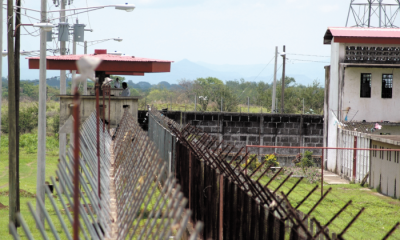
 Central America3 days ago
Central America3 days agoWashington Imposes Visa Ban on La Modelo Director Amid Crackdown in Nicaragua
-
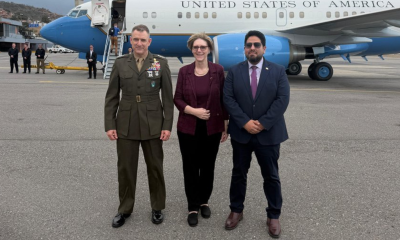
 International2 days ago
International2 days agoTop U.S. Military Commander Meets Interim Venezuelan Leaders After Maduro’s Capture
-
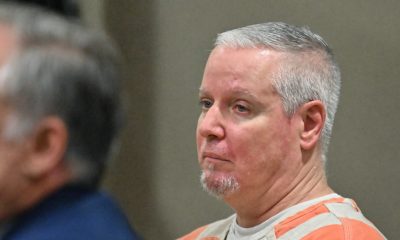
 International4 days ago
International4 days agoFather Faces Murder Charges in Georgia School Shooting Case
-
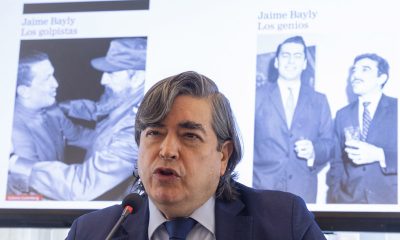
 International3 days ago
International3 days agoBayly Says Trump ‘Gets Along Better With Dictators’ and Criticizes U.S.–Venezuela Policy
-

 International3 days ago
International3 days agoRubio Engages in Quiet Discussions With Castro Family as U.S. Pressures Havana
-
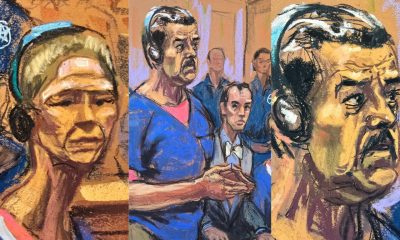
 International3 days ago
International3 days agoMaduro and Cilia Flores Receive Consular Visit in U.S. Jail Ahead of March 26 Hearing
-

 International1 day ago
International1 day agoThree Injured in Mail Package Explosion at Buenos Aires Gendarmerie Academy
-

 International1 day ago
International1 day agoU.S. Targets Members of Outgoing Boric Administration With Visa Revocations
-

 International15 hours ago
International15 hours agoTrump Defies Supreme Court With New 10% Global Tariff
-

 International4 days ago
International4 days agoSpanish Government Targets ‘Big Tech Impunity’ in AI Image Scandal
-
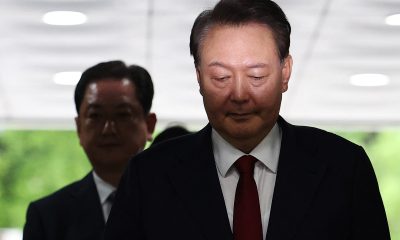
 Sin categoría2 days ago
Sin categoría2 days agoFormer South Korean President Yoon Suk-yeol Sentenced to Life for Insurrection


























